

 |
Verse 76. Treasure The Advice Of The Wise
Explanation: If one discovers a wise person who points out one’s errors and sternly corrects one, he should be looked upon as a benign revealer of a treasure. His company should be sought. Such association would make better persons of men. |
 |
Verse 77. The Virtuous Cherish Good Advice
Explanation: The wise and good person who reproaches and warns, and prevents a person from getting into anti-social behaviour, is liked by virtuous individuals - and disliked by those who are evil. |
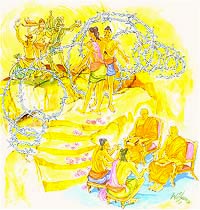 |
Verse 78. In The Company Of The Virtuous
Explanation: Do not associate with people who have evil ways. Avoid the company of wicked, evil people who are mean and bad. Associate with worthy friends. Keep the company of noble persons who are superior in quality and virtue and who will be able to elevate you. |
 |
Verse 79. Living Happily In The Dhamma
Explanation: One who delights in "The Teaching" lives happily with a pure mind. The experience of the "Sublime Ones" the wise always enjoy. |
 |
Verse 80. The Wise Control Themselves
Explanation: The irrigator who manages water is skilled in directing water to whatever place he wants. The fletcher skilfully shapes a very straight arrow-shaft out of a piece of wood by working skilfully on it. The carpenter selects a block of wood and constructs whatever he wants out of it, depending on his need. In the same way, the wise person works upon their mind, restraining it the way they desire. |
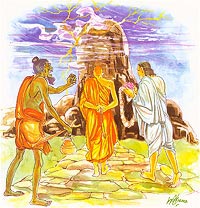 |
Verse 81. The Wise Are Steadfast
Explanation: The wise remain unmoved and unruffled both by praise and humiliation. The wise remain unshaken under all vicissitudes of life, like the solid rock that withstands the buffetings of wind, unmoved. |
 |
Verse 82. The Wise Are Happy
Explanation: The exceedingly deep oceans are tranquil, calm and are not agitated. In the same way whose wise ones who listen to the word of the Buddha acquire deep awareness and are extremely calm and tranquil. |
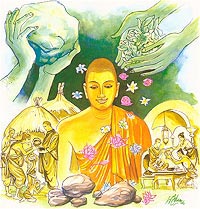 |
Verse 83. The Wise Are Tranquil
Explanation: The noble and wise persons are not attached to anything whatsoever in the world. The disciplined persons do not talk desiring worldly things, material benefits or sensual delights. Whatever fortune or ill-fortune may touch them, they remain calm, neither depressed or elated. |
 |
Verse 84. The Wise Live Correctly
Explanation: Not for one’s own benefit nor for that of others, does he desire children, wealth or kingdom. Nor does he desire self-glory. Thus he is realistic, penetrative and well behaved. |
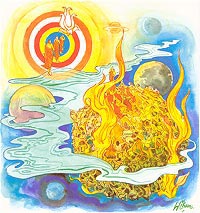 |
Verse 85. A Few Reach The Other Shore
Explanation: Of those who wish to cross over to the other side only a handful are successful. Those others who are left behind keep running along this shore. Those masses who have not been able to reach liberation continue to be caught up in Samsara. |
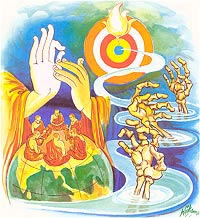 |
Verse 86. Those Who Follow The Dhamma Are Liberated
Explanation: The realms over which Mara has sway, are difficult to be crossed. Only those who quite righteously follow the way indicated in the well-articulated Teachings of the Buddha, will be able to cross these realms that are so difficult to cross. |
 |
Verse 87. Liberation Through Discipline
Explanation: The wise person abandons fully and totally those tainted views and questionable ways of behaviour and moves away from the known comforts of lay life into the unfamiliar way of life of the renunciate. He practises virtue conducive to the achievement of liberation. |
 |
Verse 88. Purify Your mind
Explanation: He takes interest in liberation. He gives up all preferences for sensualities. This way, he is without any possessions. The wise person proceeds to cleanse his mind from those defilements that blemish the mind. |
 |
Verse 89. Arahats Are Beyond Worldliness
Explanation: There are those wise individuals who have practiced extremely well the factors conducive to the attainment of liberation. They do not cling to anything emotionally or mentally. They are opposed to the tendency to be greedy and grasping, They take delight in non-grasping. They, the shining ones, who are totally bereft of blemishes, have attained liberation in this world itself. |
| |
|
|
| |
|
|
| |
|
| |
|
|
|
|
|
|
|